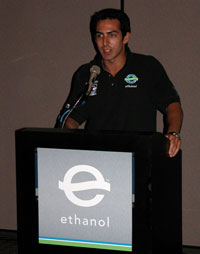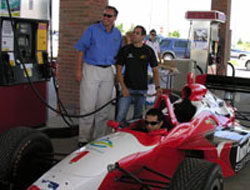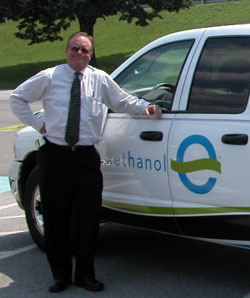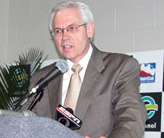 After leaving Washington, DC and the convoy I’ve been travelling with for the last 2 weeks it was on to Kansas City for the Ethanol Promotion and Information Council’s “Performance Weekend.” This is a weekend of activities for EPIC members that includes Sunday’s Kansas Lottery Indy 300 race.
After leaving Washington, DC and the convoy I’ve been travelling with for the last 2 weeks it was on to Kansas City for the Ethanol Promotion and Information Council’s “Performance Weekend.” This is a weekend of activities for EPIC members that includes Sunday’s Kansas Lottery Indy 300 race.
Here’s some members from Sterling (Colorado) Ethanol, which is building a plant in Yuma, CO checking in prior to the evening welcome reception.
 Also on hand was Rahal-Letterman team driver, Jeff Simmons. Jeff will be driving the #17 Ethanol Car in tomorrow’s race.
Also on hand was Rahal-Letterman team driver, Jeff Simmons. Jeff will be driving the #17 Ethanol Car in tomorrow’s race.
I asked Jeff how things are going and what ethanol has meant from a competitiveness standpoint in the season so far.
He says that one effect seems to be less engine problems and attributes that to the cleaner burning ethanol blend they’re using in the Indy cars this year.
Here’s my interview with Jeff:  Jeff Simmons Interview (3 min MP3)
Jeff Simmons Interview (3 min MP3)


 At the end of the cross country convoy adventure, we had one last press conference as our closing ceremony for the historic trip.
At the end of the cross country convoy adventure, we had one last press conference as our closing ceremony for the historic trip. She is Mary Eisenhower, granddaughter to President Eisenhower. Like her son Merrill, who travelled with us, she is very well spoken.
She is Mary Eisenhower, granddaughter to President Eisenhower. Like her son Merrill, who travelled with us, she is very well spoken. Board members of the
Board members of the 
 IndyCar® Series drivers Jeff Simmons (Team Ethanol) and Vitor Meira (Panther Racing), were pumping gas in Kansas City Thursday to promote ethanol. The racers are in town for Sunday’s Kansas Lottery 300 race at
IndyCar® Series drivers Jeff Simmons (Team Ethanol) and Vitor Meira (Panther Racing), were pumping gas in Kansas City Thursday to promote ethanol. The racers are in town for Sunday’s Kansas Lottery 300 race at 
 It’s the end of the convoy! Almost 3,300 miles in the Ethanol Truck.
It’s the end of the convoy! Almost 3,300 miles in the Ethanol Truck. I don’t know if every state will make a commemorative 50th anniversary of the interstate license tag but 28 of them have so far.
I don’t know if every state will make a commemorative 50th anniversary of the interstate license tag but 28 of them have so far.  First up was Mark Gaalswyk, president of
First up was Mark Gaalswyk, president of 
 In testimony before the House Agriculture Committee Thursday, USDA Undersecretary Tom Dorr paid tribute to Indy race car driver and ethanol advocate Paul Dana for his contributions to the ethanol industry.
In testimony before the House Agriculture Committee Thursday, USDA Undersecretary Tom Dorr paid tribute to Indy race car driver and ethanol advocate Paul Dana for his contributions to the ethanol industry. Group shots from the convoy have been difficult to arrange. Here we are in Emmitsburg, MD, getting ready to roll on into Washington, DC and the final ceremony this afternoon.
Group shots from the convoy have been difficult to arrange. Here we are in Emmitsburg, MD, getting ready to roll on into Washington, DC and the final ceremony this afternoon.